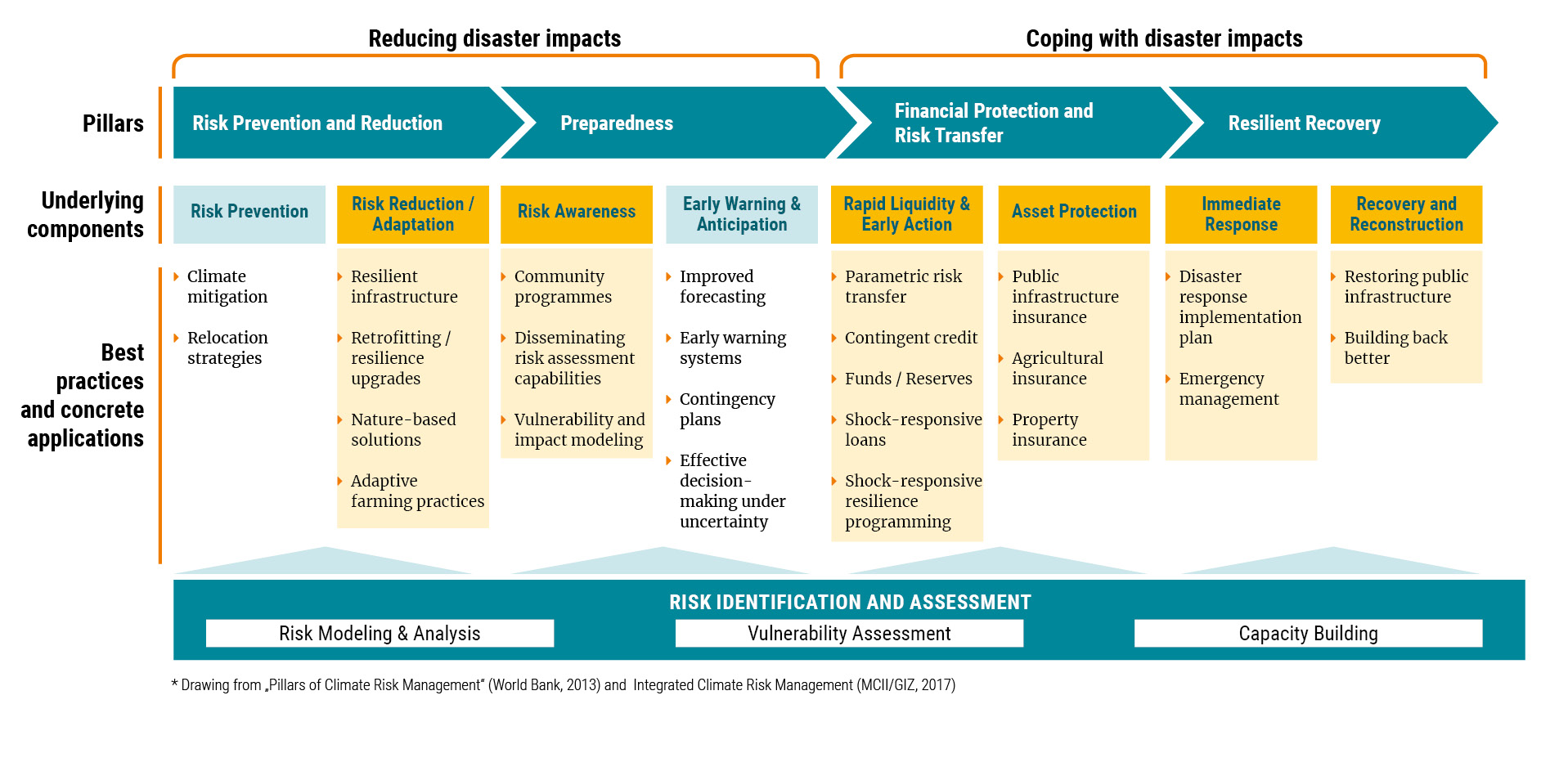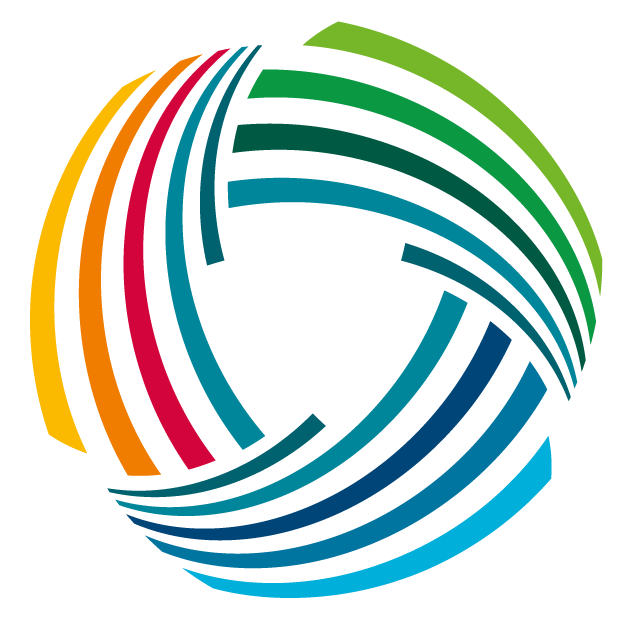Workstream 2: Action & Implementation
Enable effective action and implementation of high-quality Climate and Disaster Risk Finance and Insurance solutions in poor and vulnerable countries
A Strategic Approach to Layered Climate and Disaster Risk Financing Solutions in Fiji
By the Government of Fiji
Fiji is highly vulnerable to natural hazards. However, the country at present has limited capacity to effectively manage its climate risks and overcome constant significant economic losses after a natural disaster. Presently, there are limited ex-ante financial instruments (government reserve funds and contingent credit) available in Fiji and ex-post financial instruments deployed are usually reallocated from government budgets, acquired through external and internal borrowing or from donor assistance and international humanitarian aid. While Fiji has developed national Disaster Risk Management (DRM) plans, it does not have an integrated Climate and Disaster Risk Financing Framework to better manage disaster-centric economic losses in a holistic and coordinated manner. This limits Fiji’s ability to effectively operationalise its DRM plans and strategies.
Country Background
The frequency and severity of disasters in Fiji, as in other Pacific Small Island Developing States (PSIDS), is accelerating due to climate change¹, resulting in economic and social progress being increasingly disrupted and development gains negated over the years. Despite the high exposure to natural hazards, most people in the Pacific region do not have any type of financial protection for climate-risk disaster such as insurance. Despite being considered as having the most advanced financial sector in the Pacific, penetration rates for insurance are low in Fiji, averaging only about 12%² – a systemic issue that is synonymous in Pacific island countries.
In 2016, Fiji was struck by Tropical Cyclone Winston, a category 5 cyclone that was the strongest ever to make landfall in the southern hemisphere. It wiped out one third of national GDP overnight reversing decades of development progress. Knowing that Tropical Cyclone Winston would not be the last super-storm to befall the country, Fiji is faced with an obvious choice.
Either it musters the resources, creativity and determination to create proactive climate and disaster risk-financing solutions immediately, or it settles for the status quo and sets itself up for a far costlier cycle of continually scrambling for recovery resources after each new climate-exacerbated disaster event.
Seven more cyclones have hit Fiji since Tropical Cyclone Winston and it is high time that the country looks towards a layered and innovative approach to climate and disaster risk financing.
¹ IPCC (6 October 2018). Special Report: Global Warming of 1.5°C – Summary for Policymakers
² Source: UNCDF “National Demand Side Surveys”
Project description
Since several innovative ex-ante CDRF tools and instruments are emerging in the global markets, there is an urgent need to develop a CDRF Framework for Fiji and to introduce, test and pilot market-based CDRF instruments such as parametric insurance targeting the vulnerable and low-income populations in Fiji. One such initiative is the “Developing Climate Disaster Financing Framework and Parametric Insurance in Fiji” project, launched in October 2020, that is financially supported by the Government of India through the UN Office of South Cooperation.
The project is led by the Climate Change and International Cooperation Division under the Ministry of Economy of the Fijian Government, with support from the United Nations Capital Development Fund (UNCDF), the United Nations Development Programme (UNDP), the United Nations University – Institute for Environment and Human Security (UNU-EHS) and key stakeholders from other government ministries, public, private sector and other development partners.
The project is aligned to the Fijian Government development plans, strategies and priorities³, as well as the United Nations Pacific Strategy and UNCDF global strategies. This project will enable the Fijian Government and UNCDF to specifically target women, youth and MSME segments to work across agriculture, fisheries and tourism sectors.
The overall programme objective is to improve the financial preparedness of Fiji towards climate change and natural hazards through a combination of stakeholder engagement, co-creation of solutions, awareness and capacity building, innovative financing options and digital linkages – with a robust interface to the 2030 Sustainable Development Goals.
Led by the Fijian Government with implementation support of UNCDF, the project aims to deliver the following outputs:
- Enabling Policy and Regulation: Develop a Climate and Disaster Risk Financing Framework (CDRFF) to complement existing national disaster risk policies that are silent on financing modalities and enhance stakeholder knowledge and capacity building to establish ownership of the Climate and Disaster Risk Financing Strategy (CDRFS). The CDRF Framework will be based on the idea of risk layering that is cross matched with appropriate funding solutions such as parametric insurance, contingent credit lines, catastrophe and resilience bonds, national disaster risk funds and more.
- Inclusive Innovation: Develop market-based CDRF products including appropriate and affordable parametric insurance developed, tested and scaled to beneficiaries in vulnerable sectors such as agriculture, fisheries, MSMEs and tourism with specific focus on women, youth and MSME segments
- Digital Payment Ecosystem: Insurtech/Fintech firms combine with financial service providers to collaboratively develop, test and pilot digital solutions for onboarding clients and establishing last-mile delivery. This is part of an overarching strategy of the Fijian Government to rapidly reach vulnerable rural communities with climate and disaster risk solutions such as market based parametric micro-insurance solutions at least cost with maximum efficiency.
- Empowered Customers: Awareness, training and building financial competencies of end customers, intermediaries and beneficiaries to improve their understanding of CDRF products and solutions. The aim is to create a paradigm shift from subsidized government support post disasters to market-based proactive solutions that are more sustainable in the long run.


“In terms of risk products, in Fiji, as elsewhere in the Pacific, currently many of the existing products have such stringent compliance requirements that they are simply too expensive for ordinary and vulnerable people, let alone cater for climate and disaster risks. Developing a Climate and Disaster Risk Financing Framework will allow Fiji to create a portfolio of financing solutions that can be piloted (means tested) and scaled to create a comprehensive layer of ex-ante and ex-post climate and disaster financing solutions. The ultimate objective is to reduce fiscal shocks and build resilience for the people of Fiji. It is envisaged that the eventual success of this approach can be scaled across the Pacific to enable greater economies of scale.”
Mr Vineil Narayan, Acting Head of Climate Change and International Cooperation, Climate Change and International Cooperation Division, Fiji Ministry of Economy.

Covid-19 impact and response
For the project, our activities and business continuity plans will be tweaked to cater for these impacts and accordingly implement remedial interventions.
Fiji was the focus of the Pacific learning session during the InsuResilience Annual Partnership Forum 2020. Watch the discussion in the videos below: video 1 and video 2.
Summary Table
Overview | |
|---|---|
Risk(s) to be covered | Cyclone, flooding, drought |
Product/Solution | Affordable market-based CDRF instruments (parametric insurance) to cater to vulnerable individuals, communities and MSMEs to enable them to respond and recover quicker after a disaster. |
Objective | Improving the financial preparedness of Fiji towards climate change and natural hazards, (leveraging global interventions and experience in fintech/insurtech and fostering greater South-South Cooperation) |
Beneficiaries | Individuals, communities and MSMEs |
InsuResilience Global Partnership Members and their partner organizations/governments | Main partners are UNCDF, UNDP and UNU.
Strategic partnerships will be established with other UN agencies, CROP agencies and development partners such as the International Finance Corporation (IFC)/World Bank during the implementation of the programme. Consultations and discussions have been held with UN agencies such as the Food and Agriculture Organization (FAO), International Fund for Agricultural Development (IFAD), World Food Programme (WFP), United Nations Entity for Gender Equality and the Empowerment of Women (UN Women), United Nations Office for Disaster Risk Reduction (UNDRR), United Nations Office for the Coordination of Humanitarian Affairs (UNOCHA) and IOM as well as agencies such as the Pacific Community (SPC), Secretariat of the Pacific Regional Environment Programme (SPREP), Pacific Islands Development Forum (PIDF), University of the South Pacific (USP), World Resources Institute (WRI) and Pacific Islands Forum Secretariat (PIFS) who have expressed interest in partnering on one or more of the workstream activities and forging more alliances as the implementation progresses.
|
Climate and Disaster Risk Management
Placement of this project along the climate and disaster risk continuum:

